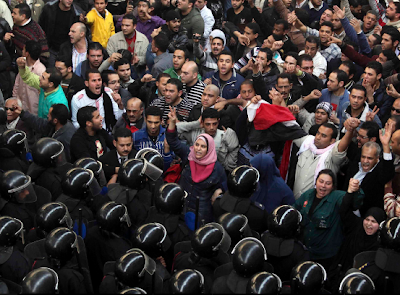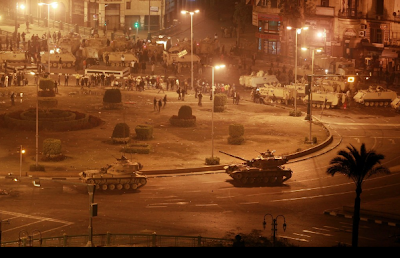Courtesy of Mish
The situation in Egypt has gone from bad to worse. Cairo is in a state of near-anarchy and Egyptian President Hosni Mubarak’s cowardly disruptions to the internet and cell phones have made things worse.
Egyptian citizens unable to get news on the internet or cell phones have only one place to get it now, the street.
President Obama called Mubarak in a 30-minute phone call. Obama’s message was "Ultimately, the future of Egypt will be determined by the Egyptian people."
If that was a hint, Mubarak did not get it. Instead, Cairo is in flames as protesters have turned more defiant.
Mubarak Orders Crackdown, With Revolt Sweeping Egypt
The New York Times reports Mubarak Orders Crackdown, With Revolt Sweeping Egypt
With police stations and the governing party’s headquarters in flames, and much of this crucial Middle Eastern nation in open revolt, President Hosni Mubarak of Egypt deployed the nation’s military and imposed a near-total blackout on communications to save his authoritarian government of nearly 30 years.
Friday’s protests were the largest and most diverse yet, including young and old, women with Louis Vuitton bags and men in galabeyas, factory workers and film stars. All came surging out of mosques after midday prayers headed for Tahrir Square, and their clashes with the police left clouds of tear gas wafting through empty streets.
By nightfall, the protesters had burned down the ruling party’s headquarters in Cairo, and looters marched away with computers, briefcases and other equipment emblazoned with the party’s logo. Other groups assaulted the Interior Ministry and the state television headquarters, until after dark when the military occupied both buildings and regained control. At one point, the American Embassy came under attack.
Six Cairo police stations and several police cars were in flames, and stations in Suez and other cities were burning as well. Office equipment and police vehicles burned, and the police seemed to have retreated from Cairo’s main streets. Brigades of riot police officers deployed at mosques, bridges and intersections, and they battered the protesters with tear gas, water, rubber-coated bullets and, by day’s end, live ammunition.
Cairo in Near-Anarchy
The Washington Post reports Cairo in near-anarchy as protesters push to oust president
The Egyptian capital descended into near anarchy Friday night, as the government sent riot police, and then the army, to quell protests by tens of thousands of demonstrators determined to push President Hosni Mubarak from office.
By the end of the day-long battle, the protesters were still standing and the police were nowhere to be seen.
It remained unclear late Friday night what role the Egyptian military might play. Mubarak, a former air force officer, draws much of his strength from the military, and any decision by the armed forces to withdraw support would mean the certain end of his reign.
But unlike the police, which unleashed an arsenal of weapons against the demonstrators, the military did not take any immediate action, and protesters gleefully welcomed the soldiers’ arrival in a thundering of personnel carriers.
Protesters were honking their horns in celebration and roaming freely through central parts of the city late in the evening, in defiance of a strict curfew. The night air was thick with black smoke, and the sounds of explosions, gunshots, sirens, cries and occasional cheers echoed through the darkness.
Success in ousting Mubarak would be a remarkable achievement for a group of demonstrators who have no charismatic leaders, little organization, and few clear objectives beyond removing this nation’s autocratic president and other members of his ruling clique.
Before this week, few thought a mass anti-government movement was possible in Egypt, a country that has little experience with democracy. But after Friday’s protests, the campaign to oust Mubarak only seems to be gathering strength.
The Washington Post has a stunning set of 57 Egypt Riot Images, some of the best I have seen yet. Here are a few of them.
Jan. 29, 2011
In this photo released by China’s Xinhua News Agency, demonstrators climb up armored vehicles at Square Tahrir in Cairo, Egypt early Saturday.
Cai Yang / AP
A protester burns a picture of Egypt’s President Hosni Mubarak during clashes in Cairo on Jan. 28, 2011.
Amr Abdallah Dalsh / Reuters
Egyptian protesters face anti-riot policemen in Cairo on Friday, Jan. 28, 2011. The riots escalated throughout the day.
Victoria Hazou / AP
Army tanks line up in Tahrir Square in Cairo.
Peter Macdiarmid / Getty Images
Thousands of protesters gather in Tahrir Square despite a curfew.
Peter Macdiarmid / Getty Images
Egypt Cuts Off Most Internet and Cell Service
The New York Times reports Egypt Cuts Off Most Internet and Cell Service
Autocratic governments often limit phone and Internet access in tense times. But the Internet has never faced anything like what happened in Egypt on Friday, when the government of a country with 80 million people and a modernizing economy cut off nearly all access to the network and shut down cellphone service.
The shutdown caused a 90 percent drop in data traffic to and from Egypt, crippling an important communications tool used by antigovernment protesters and their supporters to organize and to spread their message.
Vodafone, a cellphone provider based in London with 28 million subscribers in Egypt, said in a statement on its Web site that “all mobile operators in Egypt have been instructed to suspend services in selected areas.” The company said it was “obliged to comply” with the order.
Egypt, to an unprecedented extent, pulled itself off the grid.
Obama Calls Mubarak, Talks 30-Minutes
Bloomberg reports Obama Tells Mubarak He Must Stick to Pledge of Egyptian Reforms
President Barack Obama told Egyptian President Hosni Mubarak last night he must live up to promises he made about political, social and economic reforms following the fourth day of anti-government demonstrations across Egypt.
Obama delivered the message in a 30-minute phone call between the two leaders that followed public remarks by Mubarak in which he asked the country’s government to resign and pledged to fight poverty, speed economic and social changes, and promote civil liberties and democracy.
In a televised address to the Egyptian people just after midnight Cairo time, Mubarak said he asked his ministers to resign and promised that the new government would speed reforms and promote civil liberties. He defended his response to widespread demonstrations, which has included ordering the army to help police impose a 6 p.m. to 7 a.m. curfew by sending armored vehicles and tanks into the streets.
Obama responded that “this moment of volatility has to be turned into a moment of promise.” He also called on the Egyptian government to end the blocking of the Internet, including social networking sites that protesters have used to organize.
“Ultimately, the future of Egypt will be determined by the Egyptian people,” Obama said. “Governments have an obligation to respond to their citizens.”
At the White House, Obama said the Egyptian protestors were exercising “universal” rights to peaceful assembly and association, free speech and “the ability to determine their own destiny.
“These are human rights,” he said. “And the United States will stand up for them everywhere.”
Mubarak’s Acts of Cowardice
Shutting down the internet is an act of cowardice. Firing all your ministers while pledging reform is an act of cowardice. So is ordering Vodafone to shut down cell phone usage. Sending tanks into the street is certainly an act of cowardice.
Not only are those acts of cowardice, they have backfired. People are in open defiance of curfews. After all, they have no way to get the news but see it themselves in the streets.
By the way what is a tank supposed to do anyway? Is it really going to fire on the people? Check out that first image again. Protesters are crawling all over those tanks and armored vehicles.
As I see it, the only thing tanks can possibly do is get people stirred up. Yet, the only thing holding Mubarak’s corrupt regime together is the military.
Mubarak came up from the military so there is some loyalty there. However, the military has some genuine support from the people (unlike the despised state police), and I doubt the military will want to lose that support.
How long the military will support Mubarak is the key question at this point. I suspect not long if these riots continue.







